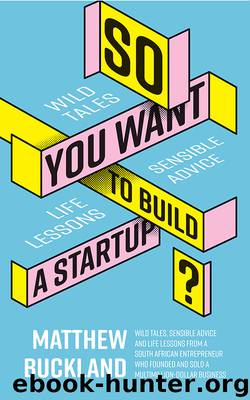So You Want to Build a Startup by Matthew Buckland

Author:Matthew Buckland
Language: eng
Format: epub
Publisher: Tafelberg
Published: 2019-06-12T12:13:57+00:00
The internet and the media have always had a special relationship. It is hard to believe now, but print media was one of the early internet pioneers, enthusiastically embracing the new medium. But before long the pioneer became one of the first businesses to be disrupted by the internet, with its business model left hanging by a thread. As for online publishing, its business model was in the process of being thoroughly disrupted by what was known as the ‘duopoly’: Facebook and Google. Perhaps ‘decimated’ rather than ‘disrupted’ is the more appropriate word to use. The reason was simple: digital media offered a second-rate advertising solution, which was centred largely on display banners.
Banners were essentially a crude import of old-world advertising slapped onto a revolutionary new medium, which was thoroughly inappropriate. A pre-social-media and pre-search form of advertising, banners were invented in the days before Facebook and Google. You can’t ‘share’ a banner ad in the way you can share an article. Nor can you search for a banner ad in the same way users search for content via Google. Banners simply didn’t fit into the new social media, search-oriented web of the new millennium, and online advertising had not evolved significantly since the first banner ad appeared on Wired magazine in 1994.
Banners were emotionally unengaging and readers often suffered from ‘banner blindness’. As an advertising medium that was not interruptive (that is, you don’t have to wait for the ad to play before you get editorial content), users looked past them and largely ignored them. A ‘good’ engagement rate for a banner ad was around 0,3%, which was hardly inspiring.
Then along came Google and Facebook, with their highly sophisticated advertising models that involved advanced targeting, contextual search and – in Facebook’s case – leveraged data from the ‘social graph’.32 Frankly, because the tech giants had better, newer and more innovative advertising options, they deserved to clean up.
Download
This site does not store any files on its server. We only index and link to content provided by other sites. Please contact the content providers to delete copyright contents if any and email us, we'll remove relevant links or contents immediately.
Hit Refresh by Satya Nadella(9132)
When Breath Becomes Air by Paul Kalanithi(8442)
The Girl Without a Voice by Casey Watson(7888)
A Court of Wings and Ruin by Sarah J. Maas(7844)
Do No Harm Stories of Life, Death and Brain Surgery by Henry Marsh(6941)
Shoe Dog by Phil Knight(5267)
The Rules Do Not Apply by Ariel Levy(4968)
A Higher Loyalty: Truth, Lies, and Leadership by James Comey(4960)
Hunger by Roxane Gay(4927)
Tuesdays with Morrie by Mitch Albom(4784)
Everything Happens for a Reason by Kate Bowler(4742)
The Immortal Life of Henrietta Lacks by Rebecca Skloot(4587)
Millionaire: The Philanderer, Gambler, and Duelist Who Invented Modern Finance by Janet Gleeson(4478)
How to Change Your Mind by Michael Pollan(4356)
All Creatures Great and Small by James Herriot(4320)
The Money Culture by Michael Lewis(4207)
Man and His Symbols by Carl Gustav Jung(4135)
Elon Musk by Ashlee Vance(4127)
Tokyo Vice: An American Reporter on the Police Beat in Japan by Jake Adelstein(3995)
